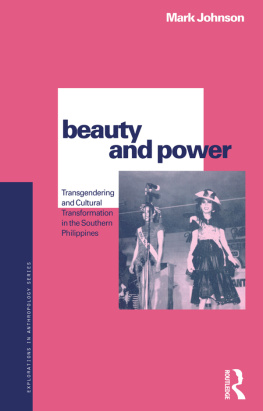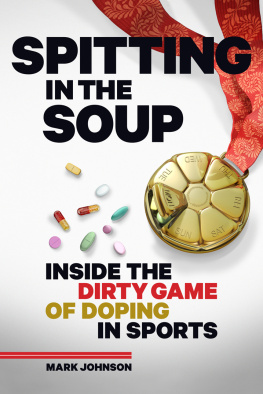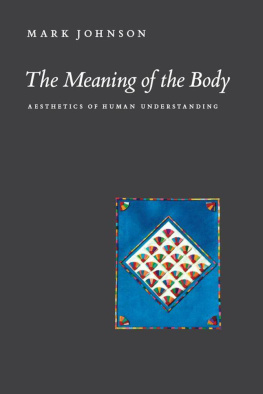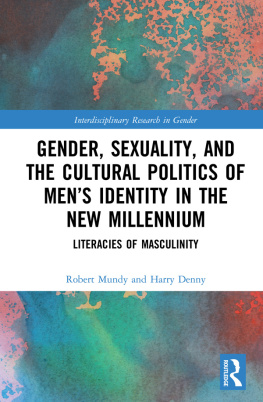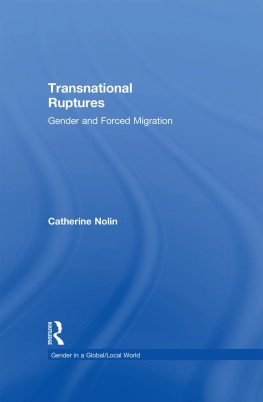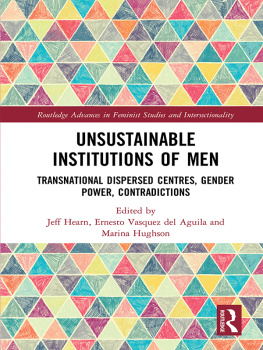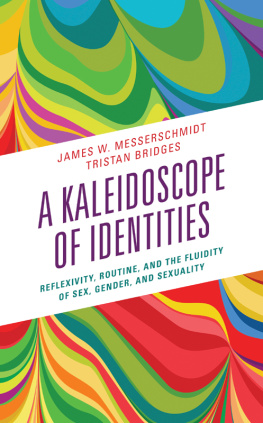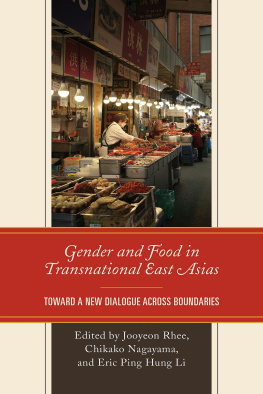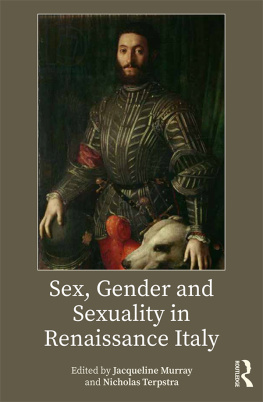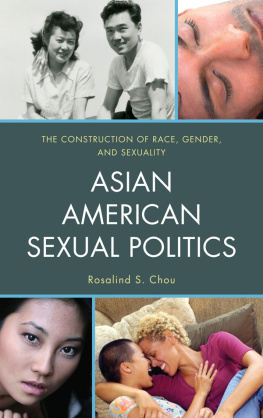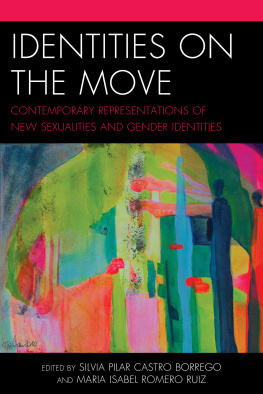Beauty and Power
EXPLORATIONS IN ANTHROPOLOGY
A University College London Series
Series Editors: Barbara Bender, John Gledhill and Bruce Kapferer
First published 1997 by Berg Publishers
Published 2020 by Routledge
2 Park Square, Milton Park, Abingdon, Oxon OX14 4RN
605 Third Avenue, New York, NY 10017
Routledge is an imprint of the Taylor & Francis Group, an informa business
Mark Johnson 1997
All rights reserved. No part of this publication may be reproduced or transmitted in any form or by any means, electronic or mechanical, including photocopying, recording, or any information storage or retrieval system, without prior permission in writing from the publishers.
Notice:
Product or corporate names may be trademarks or registered trademarks, and are used only for identification and explanation without intent to infringe.
Library of Congress Cataloging-in-Publication Data
A catalogue record for this book is available from the Library of Congress.
British Library Cataloguing-in-Publication Data
A catalogue record for this book is available from the British Library.
Typeset by JS Typesetting, Wellingborough, Northants.
ISBN13: 978-1-859-73920-4 (hbk)
For Heidi, Eliott and David, and in memory of Hugh Humphries, a friend and mentor.
This book has benefited from the contributions of many individuals, although they bear no responsibility for any shortcomings there may be. In particular I should like to acknowledge the following for critical comments and suggestions on all or portions of the manuscript. At University College London, where I completed the Ph.D. in Social Anthropology on which this book is based, I should like to thank Allen Abramson, Phil Burnham, Bruce Kapferer, Suzanne Kuchler, Nanneke Redclift, Michael Rowlands and Chris Tilley, as well as Nicolas Argenti and members of Dannys (Daniel Millers) Ph.D. student dinner group, who sat through repeated sessions of hearing me recount the ethno-graphic detail and arguments presented here. Fenella Cannell and the late Alfred Gell of the London School of Economics also provided intellectual impetus. Among my colleagues at the University of Hull, I should like to thank Andrew Dawson, Allison James and Judith Okely (Sociology and Anthropology) as well as Lawrence Nixon (Philosophy), who all made contributions to the later stages of completing the book. I should also like to thank J. Neil Garcia and Eufracio Abaya of the University of the Philippines, whose criticism and friendship I am grateful for. Ann Cowley provided much needed assistance with grammar on an earlier draft of the manuscript.
Finally, however, are individuals who have stronger claims on the book than any others. First, there is Daniel Miller, whose critical insight and intellectual energy continues to inspire me. Secondly, there are the many Tausug and Sama, and in particular the many gay identified men in Zarnboanga City and Jolo, who were willing to share some of their stories and some parts of their life with me. Last, and most important of all, I should like to thank my wife and partner, Heidi, and our two sons, Eliott and David, who have together, often under the duress of a fledgling anthropologist and academic, been a continual source of everyday practical wisdom, encouragement and inspiration.
The ethnographic research on which this book is based was funded in part by a studentship from the University of London, an Overseas Research Student Award and a grant from the graduate school research fund of University College London, for all of which I am grateful. My research in the Philippines was sponsored by the anthropology section of the National Museum of the Philippines through the good graces of Jesus Peralta, and I received assistance in Jolo, Sulu, from members of the Community Extension and Social Services departments and the CISCUL (Coordinated Investigation of Sulu Culture) Centre at the Notre Dame de Jolo.
M.J.
Destiny, as my gay friends might have said, is what brought us together. I had set out to explore contemporary material culture among the Muslim beauty contests I attended.
Miss Gay Super Model (of the World) 1991
Today was the day of the Super Gay Model (of the World) competition. I had been told about this contest for weeks now, and for most of the gays I know it had overshadowed the Hari Raya festivities marking the end of Ramadan (the Muslim period of fasting and prayers) which had ended just one week earlier. Jamey, my gay informants brother (who was also gay), had registered for the contest several weeks previously, paying a 15-peso registration fee and filling out a form that looked something like this:
- Miss Gay Super Model
- Name: Miss Regine Valasquez.
- Country representing: Miss Czechoslovakia.
- Age: 18.
- Height: 511.
- Vital statistics: 362436.
- Star sign: Virgo.
- Ambition: To be a certified public accountant CPA.
- Personal motto: Simplicity is beauty.
- Ideal man: tall, handsome, intelligent.
The contestants had been given a list of all the various awards they would be competing for. In addition to the overall winner and four runners-up, prizes were to be awarded in the following categories: best in national costume, best in evening gown, best in cocktail dress, Miss Lux, for best in skin complexion (Lux being a brand of soap) and Miss Rejoice, for hair (Rejoice being a brand of shampoo). Further prizes included Promising New Model, Best in Catwalk, Darling of the Crowd, Best Close Up and Miss Photogenic.
I picked up Jamey and Edward at their home. They were accompanied by two other gays who were coming along to support Jamey rather than participate in the contest themselves. We didnt stay long, and Edward hurried me out of the house just as I was greeting h/er mother and father. S/he said that we had to get to the parlour and that we were already running late. They took me to a beauty parlour, where Jamey and some of the other contestants were to get ready. There was a general hurried flurry of activity and a number of contestants were already being made up, among them Miss India, Miss Guam and Miss Aruba. When we came in I heard various remarks made to Edward and Jamey, such as Hey, Miss Singapore [Edward had previously participated and won a beauty contest as Miss Singapore], who is youre new friend? Arent you going to show your beauty tonight, Miss Singapore? and Wont you introduce me to your friend. However, we didnt stay long at this parlour, as apparently the two gays who were supposed to make up Jamey had already gone elsewhere.
We finally found the parlour we were looking for, although only Honey, not Arthur, the gay they were mainly looking for, was there. This was a much quieter parlour, and Jamey was the only contestant being made up at the time. Jamey kept complaining that s/he looked too much like a lannang or incik (Chinese), reminding Honey thats/he was representing Czechoslovakia, not China. Jamey and Edward also kept telling Honey to be careful with the eyes and not to make them look so small and squinty. At one point, Honey, clearly frustrated with their continual fretting and nagging, said, bahala na kamu (to hell with you!), but Jamey and Edward coaxed h/er back, saying that they didnt know how to do the hair properly and thats/he ought just to fix the eyes a bit. Another concern of Jameys was that h/er nose should have a proper high bridge effect, which was created by pencilling eyeliner along the ridge. This reminded me of comments I frequently heard that all Americans had beautiful faces and that, no matter how beautiful you are or what kind of clothes you wear, if you have a beautiful nose then you are beautiful, if not youre not.

